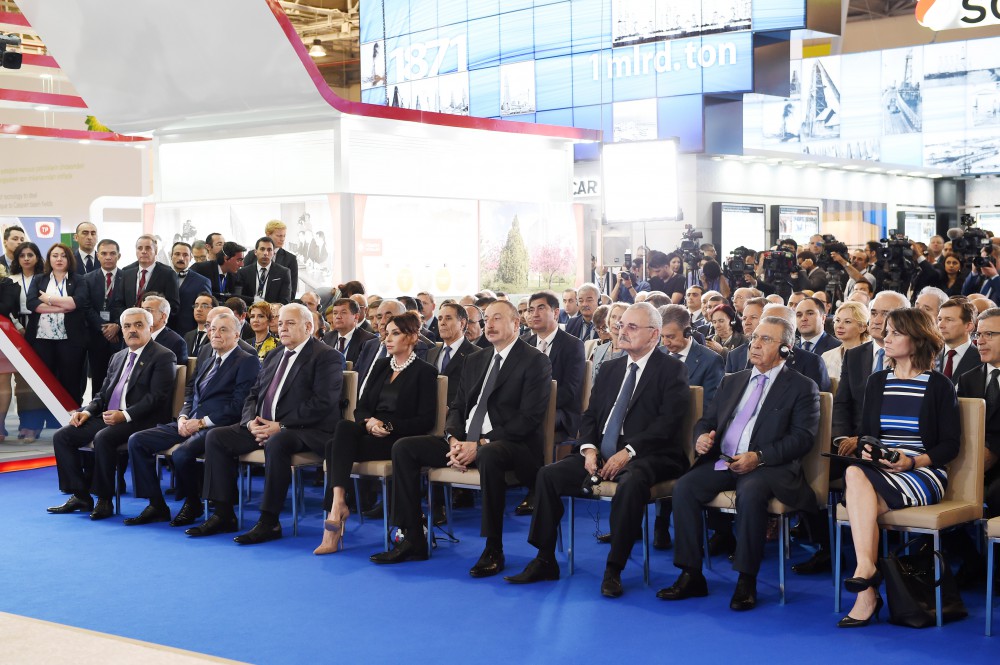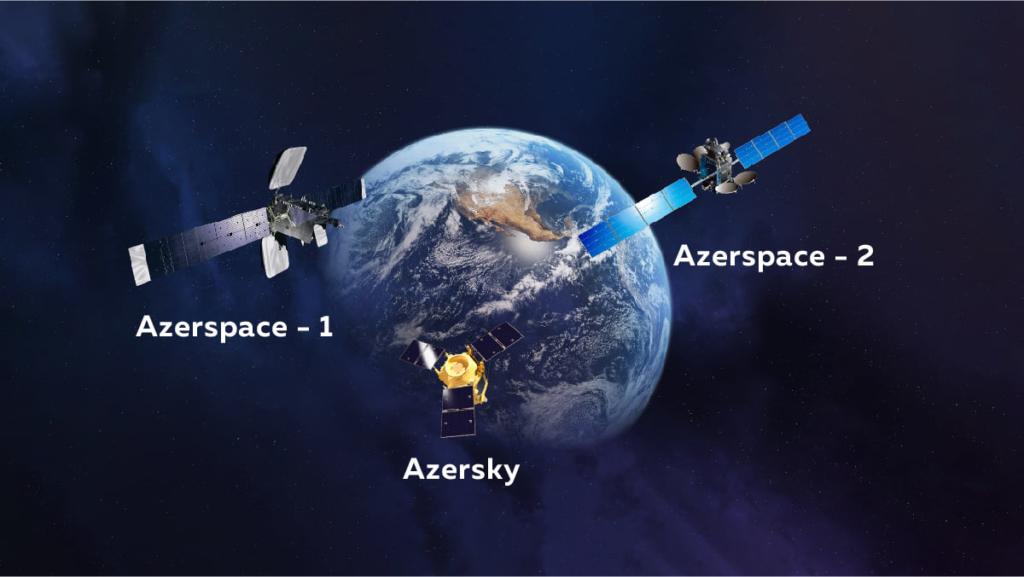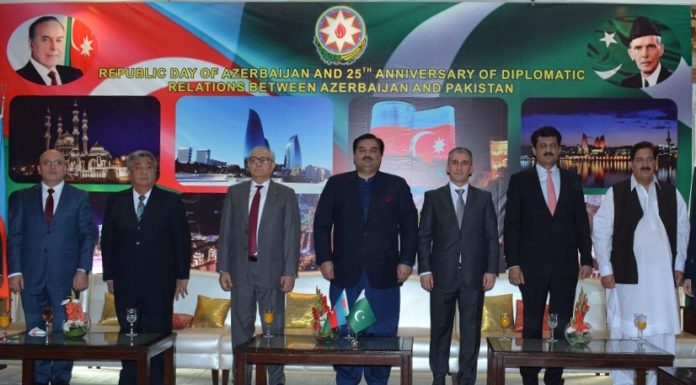The Republic of Azerbaijan celebrates 25th anniversary of Diplomatic Relations with Pakistan. Diplomatic relations between Azerbaijan and Pakistan are based on mutual respect, sharing unique commonalities of historical, religious and political nature. After the establishment of the formal diplomatic relations, there was no looking back and ties grew at a steady pace. Both countries are now strategic partners and the sky is the limit for their socio-economic integration, better political understanding and greater regional connectivity.
In the past both countries had cultural, social, religious and civilizational ties through the famous Silk Route. Caravans from both regions used this route extensively for trading purpose. Right from the beginning, the governments and the political leaderships of both sides have been keen to further develop and consolidate the bond of friendship. Both share commonality of opinion on different regional and international issues and supported each other on challenges faced.
Bilateral relations between Pakistan and Azerbaijan are constantly on the move, trade and economic ties have already been given new dimensions. Exchange of visits of Azerbaijan and Pakistani leaders as well as the other high level delegations played a pivotal role in cementing their links. Agreements in political, economic, strategic, social, humanitarian, cultural and other sectors that were signed during these visits formed a solid legislative base.
During the last 25 years Azerbaijan has achieved miraculous socio-economic prosperity and succeeded in maintaining high ratios of GDPs, per capita income, literacy, employment and the last but not the least, exports oriented policies. It is a role model of economic sustainability and political stability.
H.E. Heydar Aliyev the founding father successfully turned miseries into opportunities, tears into smiles, poverty into prosperity, unemployment into employment, dependency into self-reliance and crisis into crisscrossing of meaningful political dialogue. He introduced series of structural reforms in every field of life and economic survival. Massive industrialization, diversification of economy, optimal channelization of resources and high levels of modernity were successfully introduced and implemented after “contract of the century”. After signing of contract of the century, visionary leadership of H.E. Heydar Aliyev changed the rule of engagement with special reference to Armenia, the ultimate aggressor. It started a new era of international cooperation and robust economic growth.
President H.E. Ilham Aliyev continued the policies of H.E. Heydar Aliyev and further strengthened the constant march towards socio-economic prosperity. The Republic of Azerbaijan holds 75-80 percent of GDP of the South Caucasus which is indeed a great achievement for a country celebrating its 25th national day. Now Azerbaijan is a politically stable and vibrant country, it is now a diversified country whose 70 percent national economy is based on the non-oil sector. Services sector, construction, informational technology, exports oriented policies and strategic leadership of President H.E. Ilham Aliyev made its sovereignty irreversible.
According to its official figures Azerbaijan achieved sustainable socio-economic performance owning to which its GDP growth reached 1.3 percent in 1996, 5.8 percent in 1997, and remained averaged 10 percent during 1998-2003. During (2004-2011) country’s real GDP grew by three times. Continuation of structural reforms, liberalization of macro-economy, purposeful privatization and massive national drive of diversification of economy and resources have been rated high by many regional and international agencies (Fitch Ratings, Moody’s, Standard & Poor’s), improved “doing business facilities (World Bank, International Finance Corporation), leading place among CIS and region (World Bank Global Competitiveness Report).
Azerbaijan excelled its status in the annual ranking list of world economies for (2013-2014), (2015-2016) and (2016-2017) and consolidated its ranking as a country with the most competitive economy among the regional states. The national budget reached 19 times over the last 10 years. Incomes of population improved 6.9 percent, pensions 8.6 percent while salaries increased 6.3 times.
Despite declining prices of oil and gas in the international markets, Azerbaijan’s future socio-economic prospects are strong, stable and sustainable. According to its national figures (2016-17), its GDP would reach 3.2, 4.0 and 4.2 percent respectively in 2017, 2018 and 2019. Its non-oil GDP would further improve up to 5.5, 5.0 and 5.0 percent respectively in 2017, 2018 and 2019. Due to structural reforms, inflation would be in single-digit and under control i.e. 5.0, 4.9 and 5.0 percent during 2017, 2018 and 2019. Its current account balance would be high among all the regional countries i.e. 5.5, 5.0 and 5.6 percent during 2017-2019.
Since its inception, Azerbaijan has been passing through different phases of economic growth and has now diversified its economy. It ensured stable economy in the country. It developed human resources. It developed oil & gas industries. It maintained a sensible foreign policy.

President Ilham Aliyev introduced a successful model of diversification of economy and channelization of resources. He provided legal support to his massive national drive of diversification by signing many decrees and endorsed several development programs such as “Socio-economic development of regions in 2014-218 years”, “Azerbaijan-2020: outlook for the future”, “State program for development of industry in 215-2020 years”, etc. All these diversified but integrated policies and programs supported development of small and middle businesses and provided them with affordable soft loans, technologies and subsidies. For the further development of small and medium enterprises he announced National Fund for Entrepreneurship Support which provided necessary human and financial support to people in the region. For creating economic equilibrium President Ilham Aliyev introduced many mega development programs such as, “Year of industry” (2014) “Year of agriculture” (2015) in the country which is now paying its dividends.
According to Azerbaijan’s official figures (2017), due to balanced economic policies and constant structural reforms real estate, food service, arts and entertainment, financial and insurance, education, Administrative and support service, Construction, Human health and social work, trade and repair of transport increased by 17.4, 17.1, 10.0, 7.2, 5.9, 5.8, 5.6, 5.4, and 5.1 times respectively. Moreover, according to its state statistical committee of Azerbaijan its services sector increased “growth of production” up to 402 percent, “growth of fixed assets 198 percent and “dynamics of share of employees 18.3 percent. Mining sector experienced 286, 171, 12.3 percent growth respectively. Manufacturing sector maintained 247, 91, 11.9 percent growth. Agriculture sector achieved 173, 95, 6.1 percent increase. It is indeed a great achievement on part of Azerbaijan.
Azerbaijan has now successfully entered a new phase of economic development which is “post oil era”. Non-oil sector has now maintained a bigger share than oil sector in the macro-economy of Azerbaijan – the share of non-oil sector in Azerbaijan’s GDP was only 37 percent in 2007, but increased to 56 percent in 2014. Absolute value of non-oil sector has grown sustainably and faster than oil sector and oil sector in fact has come into a retreating cycle indicating the non-oil sector has gained a favorable foundation to emerge despite the oil-related products still dominate Azerbaijani export. These are great achievements in Azerbaijan’s economic diversification.
Azerbaijan is now a regional leader in terms of macro-economy, socio-economic prosperity, inflows of foreign direct investments (FDIs), joint ventures, political stability, protection of basic human rights, empowerment of women, democratization and politicization, tolerance, interfaith dialogue, rights of minorities, reduction of poverty and generation of new jobs on regular basis. Its mega projects in the fields of oil & gas, south-south, north-north infrastructural development and economic corridors have further strengthened its position in South Caucasus and Caspian region. Its per capita income has increased 10711.2, 13243.2, 14365.0, 15393.9, 15950.3, 15754.0, 15,888.2, 16,593, 16715.1 and 16,695.1during 2006, 2007, 2008, 2009, 2010, 2011, 2012, 2013, 2014 and 2015 respectively.
Azerbaijan maintained a record trade surplus of 509849 USD thousand in the fourth quarter of 2015. Balance of Trade in Azerbaijan averaged 2448397.93 USD Thousand from 1998 until 2015, reaching an all-time high of 8201764 USD Thousand in the second quarter of 2008 and a record low of -306551 USD Thousand in the fourth quarter of 1998.
Due to visionary leadership of President H.E. Ilham Aliyev, Azerbaijan has become a binding force in the region which has all qualities and potential to determine the course of regional as well as global politics. It had been elected a non-permanent member of the UN Security Council. Azerbaijan honorably served its term in the Security Council and continues its active participation in the international life. It has become the center of a number of global projects, a platform of dialogue between civilizations and cultures, the venue for major cultural and sporting events.

Azerbaijan is an ideal hub of human wisdom and modernity, an ideal center connecting human minds, souls and resources. It has a great role in creation of the East-West corridor and its Baku-Tbilisi-Kars railway will link Europe and Asia after completion. Its North-South corridor is a mega project which will allow transport of tens of millions of tons of cargos. Successful launching satellites “Azerspace-1” and “Azersky” into orbit has further strengthened its role in the region and beyond.
Social development has been one of the strategic priorities of Azerbaijan since independence. It initiated “concept of qualitative education for all” due to which it has now achieved a knowledge based economy. Its state education program is now rated among the best in the world. New schools, hospitals, museums, Olympic venues, cultural institutions and recreational areas are contributing to the improvement of the social life. The “ASAN xidmət” network, targeted social assistance, provision of low-income families with housing on favorable terms and other projects are the result of the ongoing national social policy.
President Ilham Aliyev signed an order on the preparation of the draft economic development strategy and the action plan for 2016-2020. “Main Directions of Strategic Roadmap on National Economy and Major Sectors of Economy” has also been announced, it covers all sectors of macro-economy to be utilized for achieving certain goals of greater socio-economic prosperity, massive industrialization, diversification of national economy and its resources and sustained social development.
One of the main goals of this strategic road map is to further strengthen economic, banking & financial reforms, liberalization, privatization and making Azerbaijan an ideal hub of high inflows of Foreign Direct Investments (FDIs), price stability, modernization of the economy, smarter production channels, and development of renewables. Ultimate objective of this strategic road map is to achieve and provide “qualitative life” to all the people of Azerbaijan through sustained socio-economic development. It is a “push-forward” systematic approach of Azerbaijan’s government to be remained as one of the most attractive, competitive and tolerant country in the region and beyond.
The strategic road map covers all important sectors of its macro-economy mainly oil and gas industry, manufacturing and processing of agricultural products, manufacturing of small and medium entrepreneurship-level consumer goods, development of heavy industry and machinery, development of specialized tourism industry, development of logistics, development of housing provision at a reasonable price, development of vocational education and training, development of financial services, development of communication and information technologies, and development of utilities (electricity and thermal energy, water and gas supply). All these are to be implemented for achieving certain goals of sustainable socio-economic prosperity, rigorous industrialization, diversification of national economy.
Azerbaijan’s success is an outcome of comprehensive, specific and targeted efforts of the last few years. Successful implementation of globally mega projects in various sectors of the economy, including energy has made Azerbaijan more competitive. Delivery of Azerbaijani natural gas to European markets via the Azerbaijan-led and Azerbaijan-initiated Southern Gas Corridor Project will be further developed. 87 percent of the work for the development of the Shah Deniz 2 gas-condensate field, 72 percent of the work for the expansion of the South Caucasus Pipeline, 60 percent of the work for the construction of the Trans Anatolian Pipeline (TANAP) and 30 percent of the work for the Trans-Adriatic Pipeline (TAP) have been completed which will be completed during 2017. It is noteworthy that Shah Deniz is one of the largest gas fields in the world with proven reserves of at least 1.2 trillion cubic meters.
One of the key strategic priorities of Azerbaijan is to further strengthen its transit potential by launching major projects. During 2017, construction of the Baku-Tbilisi-Kars railway is scheduled for completion. The implementation of this project will consequently decrease the transportation time of the goods from China to Europe from between 25 to 30 days to 12 to 15. Meanwhile, all the construction works on the Azerbaijani segment of the north-south transport corridor were finalized last year. Thus, Azerbaijan is turning into a crucial transportation hub. Today, priorities for our economic policy are further diversification of the economy, while developing the non-oil sector.
Construction of industrial parks and zones are underway to ensure development of the industry sector. In 2018, several factories will open in the Sumgait Chemical Industrial Park with investments amounting close to $2 billion. Production of cotton, tobacco, hazelnuts, tea, silkworm cocoons and other export-oriented products will increase and the number of agro parks and large farms will expand. In order to ensure development of an information sector, the quality of services and the country’s potential as an information transit corridor will further progress. The initiation of the electronic visa and the introduction of tax-free systems, as well as the recent hosting of large-scale events, such as the European Games and Formula 1 racing significantly contribute to the development of tourism in the country.
Azerbaijan is a multi-ethnic country where representatives of different ethnic groups and faiths have been living throughout centuries in an atmosphere of peace, mutual understanding and respect. A spirit of tolerance has always prevailed in Azerbaijan and 2016 was even named as the year of multiculturalism. Most recently 4th World Forum on Intercultural Dialogue was held in Baku.
Its State Customs Committee said in a report (2017), due to its successful “commercial diplomacy” some 183 countries became Azerbaijan’s foreign trade partners in January-November 2016 compared to 162 countries in the same period of 2015. Non-oil sector of economy grew 2.4 percent in the first quarter of 2017. Agriculture increased 3.5 per cent More than 80,000 jobs were created in three months. Trade turnover increased 15 per cent, exports experienced 50 per cent growth, and imports fell 17 percent. The export of agricultural products increased 44 percent.
The Azerbaijani economy developed by 3.5 times over the past 10-12. During last decade, pensions and salaries increased by approximately threefold in Azerbaijan and 1.5 million jobs were created. “Last year alone, 90,000 new jobs were created in the country. Azerbaijan became an example for other countries in the field of poverty reduction as a result of targeted policy, the poverty level decreased from 49 to five percent in the country.
The country’s economic power, international prestige and reputation have increased significantly. The three-fold expansion of the national economy, up to 10 times decline in the poverty rate, well established modern socio-manufacturing infrastructure and fast regional development demonstrate that Azerbaijan has passed the way, other countries failed to pass for decades, over a very short period of time.




